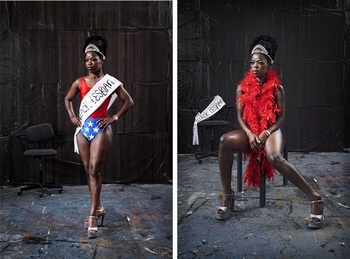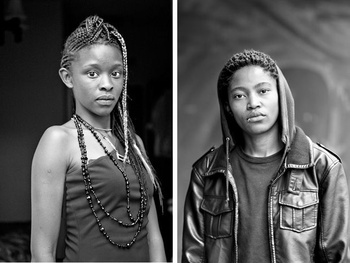Zanele Muholi, Miss Lesbian I & II, 2009 Photo: Sean Fitzpatrick © Zanele Muholi
A black lesbian in South Africa lives every day under the menace of extreme hate and brutal violence. The photographer and “visual activist” Zanele Muholi has stepped out of the shadows and is no longer silent. She has taken up the struggle against prejudice with her camera; her pictures are weapons in the fight against ignorance. “If anything happens to me, at least it would be for something.”
Corrective or curative rape. You can figure out the repulsive meaning of that phrase: being lesbian is a sickness that must be rooted out. Not with a pill – that would be too easy. The remedy is violent, cowardly, and unspeakable. In South Africa, people from the LGBTI (lesbian, gay, bisexual, transgender, intersex) community daily face hate crimes that aim to force them to abandon their “un-African” behaviour and cast off their identity.
Zanele Muholi (1972), who is part of the “Where We’re At! Other Voices on Gender” exhibition during this year’s Summer of Photography, gives a face to the anonymous stream of stories about violence and abuse. Whether in bold colours or in straightforward, timeless black and white, she gives her friends a voice and reinforces their identity. Her portraits and reportage focus on life in the LGBTI community. Muholi has won a lot of praise for her ongoing project “Faces and Phases”, in which serene black-and-white portraits celebrate the lives of the people around her and commemorate those who have died as a result of HIV or hate crimes. Says Muholi: “Photographers need to have hearts. I feel. I use my six senses when I embark on a project. It’s important for us to put ourselves in the shoes of the people we document.”
Summer of Photography: Zanele Muholi


Zanele Muholi, Tinashe Wakapil, Harare, Zimbabwe 2001 & Xana Nylenda, Newton, Johannesburg 2011, "Faces & Phases" series courtesy of the artist & Stevenson Gallery, Cape Town
Zanele Muholi’s efforts have not gone unnoticed. She has won numerous awards and in 2013 her work was selected for dOCUMENTA (13), the Venice Biennale, and Sao Paulo. That international recognition came after a major setback. In 2012 someone broke into her studio-home and stole her photographic archive; the rest of her home was left untouched. How do you survive something like that? As Muholi sees it, “You can’t. I’m not coping at all and it’s constantly on my mind. I really hope that somebody will bring those hard drives back and admit they’ve made a mistake and they’re sorry. I don’t even want to know what their intention was. All I want is the stolen hard drives. I call it a form of sabotage, an attempt to slow me down and to shut me up. The loss is indescribable. The biggest loss I suffered in my life was losing my mom in 2009. But that’s part of life. The hard drive became something else: most of the work was unpublished. There were lives in those hard drives. Someone just erased those moments.”
Are you never afraid?
Zanele Muholi: In South Africa, lesbians are exposed to danger on a daily basis. There are the curative rapes and brutal murders in the LGBTI community. Me and the persons I photograph are all at risk, but if I say I’m afraid that means I’m defeated. I won’t allow that. But to be honest: of course I’m afraid, but if I stop what would that mean? There are people depending on me to change South African LGBTI visual imagery. By changing the way people look at us, we can undo the fear. Nobody should be violated. We are living in a democratic country. According to the constitution of South Africa I’m protected by the law, so why do I have to be afraid of living? I’m not committing any crimes. As much as I’m scared of my life, I won’t stop.
You call yourself a visual activist. What does that mean?
Muholi: I want to make important work instead of beautiful work. The visual politics and the visual poetics of the subject matter come first; aesthetics comes later. There are not many visual historians and activists in South Africa. I feel I have to take action by rewriting the visual history that denied the existence of so many lesbians. I’m giving them a right to speak. With these images of black lesbian culture, I want to educate people, influence South African policy, and inspire others to share their stories. I need to take responsibility, because I want to see change, regardless of the challenges that we might go through or the continuous struggle we face of losing our beloved ones. But I don’t want to talk too much about that. My photographs have to speak for themselves. I’ve managed to say what I want to say and I keep on saying it. At some stage I feel like I haven’t done much, but I manage to articulate my issues and express myself through photography.
Why did you choose photography for your activism?
Muholi: Photography is a medium people can immediately connect with and it’s easy to understand. I want to be direct and make viewers understand that I’m talking about real people here. I’m dealing with lives. They are not models. Abstraction is something we can’t use at this time: we need to be specific.
Photography is more than just a medium: it’s a way of life?
Muholi: I can’t say that photography is political for everyone, but it is for me. It’s a way of life and a religion. In my photographs I can tell my own life story and those of my friends in a way that the viewer understands. It’s one thing to write about the South African LGBTI community, but the minute you visualise it, it creates a dialogue and a debate with the viewer. It’s very important to share the moments with our loved ones with the world. That’s what we need to do right now: share ourselves with the people. By sharing our visual narratives, we make people understand that we exist and we are still facing many struggles.
SUMMER OF PHOTOGRAPHY
Where we’re at! Other Voices on Gender 18/6 > 31/8, di/ma/Tu > zo/di/Su 10 >18.00 (do/je/Th > 21.00), BOZAR, rue Ravensteinstraat 23, Brussel/Bruxelles,
02-507.82.00, www.summerofphotography.be
Difficult love (video) 16/6, 20.00, € 6/4, BOZAR
Zanele Muholi’s efforts have not gone unnoticed. She has won numerous awards and in 2013 her work was selected for dOCUMENTA (13), the Venice Biennale, and Sao Paulo. That international recognition came after a major setback. In 2012 someone broke into her studio-home and stole her photographic archive; the rest of her home was left untouched. How do you survive something like that? As Muholi sees it, “You can’t. I’m not coping at all and it’s constantly on my mind. I really hope that somebody will bring those hard drives back and admit they’ve made a mistake and they’re sorry. I don’t even want to know what their intention was. All I want is the stolen hard drives. I call it a form of sabotage, an attempt to slow me down and to shut me up. The loss is indescribable. The biggest loss I suffered in my life was losing my mom in 2009. But that’s part of life. The hard drive became something else: most of the work was unpublished. There were lives in those hard drives. Someone just erased those moments.”
Are you never afraid?
Zanele Muholi: In South Africa, lesbians are exposed to danger on a daily basis. There are the curative rapes and brutal murders in the LGBTI community. Me and the persons I photograph are all at risk, but if I say I’m afraid that means I’m defeated. I won’t allow that. But to be honest: of course I’m afraid, but if I stop what would that mean? There are people depending on me to change South African LGBTI visual imagery. By changing the way people look at us, we can undo the fear. Nobody should be violated. We are living in a democratic country. According to the constitution of South Africa I’m protected by the law, so why do I have to be afraid of living? I’m not committing any crimes. As much as I’m scared of my life, I won’t stop.
You call yourself a visual activist. What does that mean?
Muholi: I want to make important work instead of beautiful work. The visual politics and the visual poetics of the subject matter come first; aesthetics comes later. There are not many visual historians and activists in South Africa. I feel I have to take action by rewriting the visual history that denied the existence of so many lesbians. I’m giving them a right to speak. With these images of black lesbian culture, I want to educate people, influence South African policy, and inspire others to share their stories. I need to take responsibility, because I want to see change, regardless of the challenges that we might go through or the continuous struggle we face of losing our beloved ones. But I don’t want to talk too much about that. My photographs have to speak for themselves. I’ve managed to say what I want to say and I keep on saying it. At some stage I feel like I haven’t done much, but I manage to articulate my issues and express myself through photography.
Why did you choose photography for your activism?
Muholi: Photography is a medium people can immediately connect with and it’s easy to understand. I want to be direct and make viewers understand that I’m talking about real people here. I’m dealing with lives. They are not models. Abstraction is something we can’t use at this time: we need to be specific.
Photography is more than just a medium: it’s a way of life?
Muholi: I can’t say that photography is political for everyone, but it is for me. It’s a way of life and a religion. In my photographs I can tell my own life story and those of my friends in a way that the viewer understands. It’s one thing to write about the South African LGBTI community, but the minute you visualise it, it creates a dialogue and a debate with the viewer. It’s very important to share the moments with our loved ones with the world. That’s what we need to do right now: share ourselves with the people. By sharing our visual narratives, we make people understand that we exist and we are still facing many struggles.
SUMMER OF PHOTOGRAPHY
Where we’re at! Other Voices on Gender 18/6 > 31/8, di/ma/Tu > zo/di/Su 10 >18.00 (do/je/Th > 21.00), BOZAR, rue Ravensteinstraat 23, Brussel/Bruxelles,
02-507.82.00, www.summerofphotography.be
Difficult love (video) 16/6, 20.00, € 6/4, BOZAR
Read more about: Expo
Fijn dat je wil reageren. Wie reageert, gaat akkoord met onze huisregels. Hoe reageren via Disqus? Een woordje uitleg.